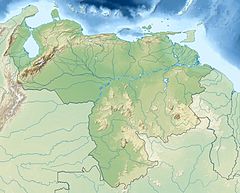"Cochranella" riveroi
| "Cochranella" riveroi | |
|---|---|
| Scientific classification | |
| Domain: | Eukaryota |
| Kingdom: | Animalia |
| Phylum: | Chordata |
| Class: | Amphibia |
| Order: | Anura |
| Family: | Centrolenidae |
| Genus: | "Cochranella" |
| Species: | "C." riveroi
|
| Binomial name | |
| "Cochranella" riveroi (Ayarzagüena, 1992)
| |
| Synonyms[2] | |
| |
"Cochranella" riveroi is a species of frog in the family Centrolenidae.[2][3] It is endemic to Cerro Aracamuni, Venezuela. The generic placement of this species within the subfamily Centroleninae is uncertain (incertae sedis ).[2][3]
Taxonomy and systematics
[edit]This species was originally described as Centrolenella riveroi. However, most subsequent studies have placed it in the genus Cochranella.[2][4] A study published in 2002 suggested that it belongs to the Cochranella spinosa group.[2] However, morphological data do not allow unambiguous generic placement. With no molecular data available, it is—for the time being—retained in Cochranella.[2][3]
Description
[edit]Two adult males measured 21.6 and 22.1 mm (0.85 and 0.87 in) while a single female measured 25.0 mm (0.98 in) in snout–vent length; the female had 21 eggs 2.3–2.5 mm (0.091–0.098 in) in diameter in her ovaries. The tympanum is visible. The fingers are slightly webbed and the toes moderately webbed. The dorsal skin is strongly granular. The coloration of living specimens is unknown.[4]
Habitat and conservation
[edit]The type series was collected from terrestrial bromeliads at the summit of Cerro Aracamuni at about 1,600 m (5,200 ft) above sea level.[1][4] The vegetation at the summit is mostly low (<1 m), with forested areas in depressions and along streams.[4]
There are no known threats to this species, although its small range makes it vulnerable (Cerro Aracamuni is a tepui with a relatively small summit[4]). It occurs in the Serranía de la Neblina National Park.[1]
References
[edit]- ^ a b c IUCN SSC Amphibian Specialist Group (2020). "Cochranella riveroi". IUCN Red List of Threatened Species. 2020: e.T54987A109531178. doi:10.2305/IUCN.UK.2020-3.RLTS.T54987A109531178.en. Retrieved 15 November 2021.
- ^ a b c d e f Frost, Darrel R. (2017). ""Cochranella" riveroi (Ayarzagüena, 1992)". Amphibian Species of the World: an Online Reference. Version 6.0. American Museum of Natural History. Retrieved 16 May 2017.
- ^ a b c Guayasamin, J. M.; Castroviejo-Fisher, S.; Trueb, L.; Ayarzagüena, J.; Rada, M.; Vilà, C. (2009). "Phylogenetic systematics of glassfrogs (Amphibia: Centrolenidae) and their sister taxon Allophryne ruthveni". Zootaxa. 2100: 1–97.
- ^ a b c d e Señaris, J. C.; Ayarzagüena, J. (2005). "Revisión taxonómica de la Familia Centrolenidae (Amphibia; Anura) de Venezuela". Publicaciones del Comité Español del Programa Hombre y Biosfera – Red IberoMaB de la UNESCO. 7: 1–337.(Cochranella riveroi: p. 141–146)


